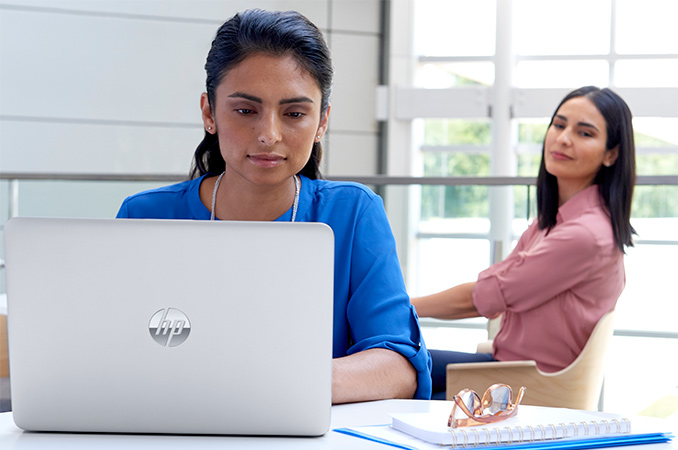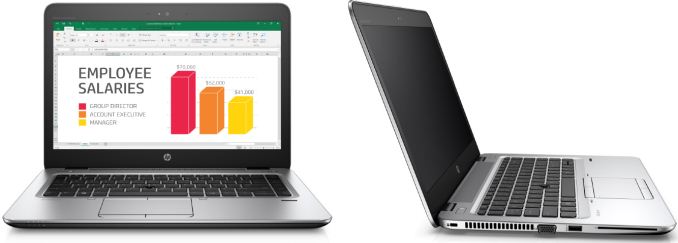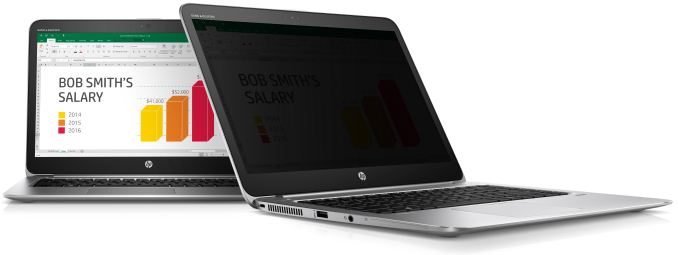HP Announces EliteBook Laptops with On/Off Sure View Privacy Screens
by Anton Shilov on August 26, 2016 10:30 AM EST
On Thursday, HP introduced adjustable privacy screens for the EliteBook 840 as well as the EliteBook 1040 notebooks. These are aimed at business users concerned about visual hacking and disclosing sensitive information to onlookers (something a number of journalists have to consider when working on NDA information when flying back from a press event). The protective measures for the screens are based on the Sure View technology jointly developed by HP and 3M, which relies on a number of HP’s proprietary technologies as well as 3M’s optical films. Ultimately, the user can control the privacy with an on/off switch as required, rather than equipping a perminant film that can reduce comfort. Right now, the Elitebook laptops are the first batch to get the technology, but eventually HP’s Sure View technology may appear on other PCs from the company depending on feedback.
In the conference call, HP was keen to point out that according to the Pew Research Center, around 60% of employees nowadays take their work outside of office walls and can potentially (without knowing) share confidential information with the wrong people. Most users that have to work while on the move might not be aware of who is staring at their displays from the back or from the side (which is incredibly annoying in general even if you are playing Tetris). Knowing that, HP explained that some employees tend not to work with sensitive data in public places, which can reduce their overall productivity. Meanwhile there is a market to ensure privacy in cafes, airports and other venues - other people install aftermarket privacy screens on their laptops. While that helps businesses to better comply with regulatory requirements in healthcare, finance and industries dealing with sensitive information, such screens reduce viewing angles of notebooks which affects overall user experience. By contrast, HP’s Sure View can be turned on and off, thus improving privacy without persistent reduction of viewing angles of laptop screens.
HP’s Sure View technology uses a special film from 3M as well as HP’s own backlighting. When the setting of the backlighting is adjusted, the film decreases viewing angles of the display down to around 35 degrees. The tech can be activated by pressing Fn + F2 and actual viewing angles can be further adjusted by pressing other combinations of buttons (viewing angle adjustments are independent of brightness and one is not dependent on the other). HP claims that the technology can be used with different display panels, but initially the company will use the technology on TN or SVA panels with FHD resolution. The Sure View does not consume extra power and since it relies on different setting of the backlighting, it might help to improve battery life a bit. HP does not reveal the price of its integrated privacy screen technology, but claims that with higher-end configs it will be virtually free. Moreover, the company mentioned that since it is not just a film on top of the display itself, it is going last throughout the lifetime of the laptop.
As for configurations, the HP EliteBook 840 G3 and the HP EliteBook 1040 G3 are 14” laptops based on Intel’s dual-core Core Skylake-U chips with integrated HD Graphics 520 and vPro (select models only). They come with up to 32 GB of DDR4-2133 memory and use 2.5” HDDs/SSDs (EliteBook 840) or M.2 SSDs (EliteBook 1040). The notebooks are equipped with 802.11ac WiFi + Bluetooth modules, Gigabit Ethernet (via dongle in case of the 1040) as well as an LTE or HSPA+ WWAN module. As with many business PCs, the systems are equipped with anti-spill keyboards, fingerprint readers (optional in case of the 840) and TPM 1.2/2.0 modules.
Both laptops feature 14” display panels and are fairly light and thin for mainstream business models. The EliteBook 840 weighs 1.48-1.7kilograms and is 1.89-2.02cm thick (the peak values for touch-enabled models. Meanwhile, the EliteBook 1040 weighs starting at 1.43 and is 1.58-1.65cm thick. Depending on the exact configuration, the EliteBook 840 can work for up to 13.5 hours, whereas the EliteBook 1040 can boast with 10 to 11.5 hours of battery life. Since configurations of the notebooks can vary, HP does not mention recommended prices, but we are talking about machines that start at around $1200 and can end up at $2000 or higher. B2B sales will differ in price depending on volume and support packages. Users should see systems with Sure View privacy screens available in September.
Source: HP


















43 Comments
View All Comments
BrokenCrayons - Friday, August 26, 2016 - link
So let me get see if I understand this. Passive matrix LCDs, those smeary old things we used to be forced to deal with on laptops that had terrible viewing angles, were slowly replaced over the ensuing decades by better and better panels that had wider viewing angles (a metric often measured in reviews and espoused as a benefit to the owner). Those widely viewable screens are now getting a privacy filter to compensate for the problem of their wide viewability. Now limited viewing angles are being offered as a selling point and checkbox feature. Amusing.JoeyJoJo123 - Friday, August 26, 2016 - link
Yeah, this is pretty much a joke.WKCook - Friday, August 26, 2016 - link
Privacy screens are NOT a joke if you have to work in public areas. Should-surfing is a real threat to security!JoeyJoJo123 - Friday, August 26, 2016 - link
>have to work in public areasYou have no requirement to work in public areas. Nobody does. And if they do, then it isn't their fault, nor should it be their concern, if someone is actively trying to spy on them from a public area; After all it's not their work policy that forced them to _HAVE_ to work in a public area, but the company's policy, and it's their loss whenever the company loses information in this manner.
Last time I checked, no company required you to have to pull out your work laptop and work in a public Starbucks or something. If you do, that's your own problem, and you should be more deliberate about where you do confidential work, particularly if you're in a public area.
>Should-surfing is a real threat to security!
Sure thing, bro. And the NSA, Facebook, and Google aren't.
artemicion - Friday, August 26, 2016 - link
If you don't need it don't buy it. In the real world, security isn't as black and white as you make it seem. In the real world, people work on projects in public places that don't involve hyper confidential national secrets. It's not information they want disseminated out in the public, but it's not something so secretive that they have to work in a cellar 1,000 ft below ground level either. For example, someone who commutes on the subway every morning may choose to use that time to read/send personal or business e-mails. They aren't "required" to work on the subway, but they'd rather work during that time, with some modicum of security, rather than dawdle about doing nothing for 30 minutes and do the work at home or stay later in the office instead of spending time with their kids.snowmyr - Friday, August 26, 2016 - link
@JoeyJoJo123 Seriously WTF? Who is trying to shift the blame from companies to the individual worker? Privacy screens are a real thing and I imagine are usually purchased by companies to put on their laptops.>Last time I checked, no company required you to have to pull out your work laptop and work in a public Starbucks or something.
When was that? Many people are expected to work while travelling and not having the person in the seat next to you reading your screen could be useful.
But what's the problem? Your hostility to a technology widely used in the corporate world for no apparent reason is bizarre.
Samus - Friday, August 26, 2016 - link
I love how clueless all the haters are of enterprise security policies on these forums. I expected more from AT readers.Polarizing filters are a multi-million dollar industry for 3M. Why? Because people buy them. Any HIPPA or FICO compliant facility has them on any reception display, and a lot of companies have mixed security clearances even on the SAME FLOOR, so every desk has a privacy filter.
This is incredibly common technology in corporate America and HP is going to sell tens of thousands of these laptops just for that reason while they have the market cornered.
Solandri - Saturday, August 27, 2016 - link
The amusing thing is the people hating on this are probably the same people who get all upset every time a company loses their personal info due to a hack.After being kept awake on a redeye flight after the cabin lights were turned off because the person sitting next to me pulled out their laptop to work on some business presentation, I am all for this. And from a technology standpoint, the fact that they can turn this on/off and control the angle is intriguing. I can think of a lot of other applications for it outside of laptops. Like putting it on a window so that you can still see straight out the window, but sunlight coming through from higher up is blocked to help cut down on the air conditioning bill.
Murloc - Monday, August 29, 2016 - link
why not use the eye cover?Right, airlines suck in america.
fanchiuho - Monday, August 29, 2016 - link
>You have no requirement to work in public areas. Nobody does. And if they do, then it isn't their faultI don't know about you but to many of us, work policy and work freedom are not mutually exclusive.
>you should be more deliberate about where you do confidential work
I thought using these technologies are one of the solutions to be deliberate about security. Why compromise on time, when you get the option to use more secure computing? You seem to miss the point of executives and outdoor professionals being a sizeable demographic, thus market.
>Sure thing, bro. And the NSA, Facebook, and Google aren't.
That like saying you shouldn't use privacy windows on your car because your tyres are going to be stolen anyways.